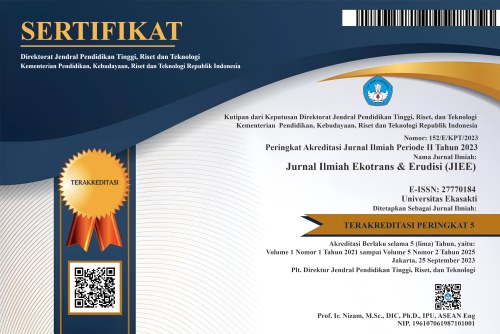The Position and Urgency of the Justice Collaborator in the Crime of Shooting by Richard Eliezer (Ruling Number: 798/Pid.B/ 2022/ PN. Jkt. Sel)
DOI:
https://doi.org/10.69989/xdzz1p20Keywords:
Justice collaborator, Criminal act of shootingAbstract
The position of witnesses is very important in the trial process because witnesses provide proof of the guilt of the suspect and defendant based on what they saw and experienced. A justice collaborator is a person who is a witness to a criminal act and collaborates with the main perpetrator. If one of the perpetrators of a particular criminal act admits what was done but is not the main perpetrator of the action, they provide information as a witness in the criminal trial. The problems that will be discussed in this research are what is the position of Justice Collaborator in Indonesian criminal law, what is the urgency of Richard Eliezer as Justice Collaborator in the criminal case of the shooting of Joshua Hutabarat (analysis of decision Number: 789/Pid.B/ 2022/PN. Jkt.Sel ). In carrying out this research the author used a method that can answer the problem formulation in this research, namely qualitative with a normative juridical approach. In several cases, the judge handling the Justice Collaborator referred to the Supreme Court Circular No. 04 of 2011 concerning handling Justice Collaborators in certain criminal cases, or SEMA No. 04 of 2011. Protection Regulations carry out protective actions and cooperate with justice. Whistleblowers cannot be prosecuted criminally or civilly for reports or statements made, made, or have been made. However, witnesses cannot be acquitted of criminal charges in the same case if their guilt is clearly proven in court. Because of his testimony, the judge was able to reduce the sentence. The Justice Collaborator is currently regulated by law. The Justice Collaborator is essential to organizing an orderly system of justice and providing effective enforcement and protection for those who are or will be witnesses. It also plays an important role in preventing criminal activity by achieving goals, fostering trust, fostering respect, and encouraging legal cooperation. Supreme Court Circular No. 4 (SEMA) of 2011 states that the government must be involved in investigating cases of witnesses and victims, emphasizing that the idea of justice collaborators is based on the belief that people who are punished for their actions can be used to ensure justice in criminal cases.
Downloads
References
Ali, M. (2022). Dasar-dasar hukum pidana. Sinar Grafika.
Alin, F. (2017). Sistem Pidana dan Pemidanaan di dalam Pembaharuan Hukum Pidana Indonesia. JCH (Jurnal Cendekia Hukum), 3(1), 14–31.
Atmasasmita, R. (2017). Rekonstruksi asas tiada pidana tanpa kesalahan. Gramedia Pustaka Utama.
Braga, A. A., Weisburd, D., & Turchan, B. (2018). Focused deterrence strategies and crime control: An updated systematic review and meta‐analysis of the empirical evidence. Criminology & Public Policy, 17(1), 205–250. https://doi.org/10.1111/1745-9133.12353
Eddyono, S. W. (2011). Melihat Prospek Perlindungan Pelaku yang Bekerjasama di Indonesia. Jurnal LPSK, Nomor, 1.
Forrester, A., & Hopkin, G. (2019). Mental health in the criminal justice system: a pathways approach to service and research design. Criminal Behaviour and Mental Health, 29(4), 207–217. https://doi.org/10.1002/cbm.2128
Harahap, M. Y. (2002). Pembahasan permasalahan dan penerapan KUHAP penyidikan dan penuntutan Edisi kedua.
Hikmawati, P. (2016). Upaya Perlindungan Whistleblower dan Justice Collaborator dalam Tindak Pidana Korupsi. Negara Hukum: Membangun Hukum Untuk Keadilan Dan Kesejahteraan, 4(1), 87–104.
Ibrohim, A., Budiarsih, B., & Suhartono, S. (2020). Analisis terhadap Sanksi Korporasi Pelaku Dumping Limbah tanpa Izin Perspektif HAM. Tapis: Jurnal Penelitian Ilmiah, 4(1), 111–122.
Lamintang, P. A. F., & Lamintang, F. T. (2022). Dasar-dasar hukum pidana di Indonesia. Sinar Grafika.
Lubis, M. I., Kalo, S., Ablisar, M., & Hamdan, M. (2019). Pelindungan Hukum Terhadap Justice Collaborator Dalam Hukum Pidana di Indonesia: Analisis Putusan Mahkamah Agung No. 2223K/Pid. Sus/2012. USU Law Journal, 7(3).
Maghaz, R. B. (2019). Permasalahan Penuntutan Terhadap Pelaku Penyalah Guna Narkotika di Wilayah Hukum Kejaksaan Negeri Padang. JCH (Jurnal Cendekia Hukum), 4(2), 166–186.
Mazerolle, L., Bennett, S., Davis, J., Sargeant, E., & Manning, M. (2013). Procedural justice and police legitimacy: A systematic review of the research evidence. Journal of Experimental Criminology, 9, 245–274. https://doi.org/10.1007/s11292-013-9175-2
Mulyadi, L. (2014). Perlindungan Hukum Whistleblower dan Justice Collaborator dalam Upaya Penanggulangan Organized Crime di Indonesia Masa Mendatang. PADJADJARAN Jurnal Ilmu Hukum (Journal of Law), 1(3).
Mustika, E. A. A., & Wahyuni, S. (2022). Pertimbangan Hakim Dalam Menjatuhkan Putusan Pidana (Studi Kasus Pada Putusan Nomor 317/PID. SUS/2019/PN. PDG). JUDAKUM: JURNAL DEDIKASI HUKUM, 1(2), 137–148.
Paternoster, R. (2019). How much do we really know about criminal deterrence? In Deterrence (pp. 57–115). Routledge.
Pratama, B. D., & Budiarsih, B. (2023). Analisis Kebijakan Kedudukan Justice Collaborator dan Whistleblower dalam Tindak Pidana Korupsi. Bureaucracy Journal: Indonesia Journal of Law and Social-Political Governance, 3(1), 313–327.
Puteri, R. P., Junaidi, M., & Arifin, Z. (2020). Reorientasi sanksi pidana dalam pertanggungjawaban Korporasi di Indonesia. Jurnal USM Law Review, 3(1), 98–111.
Putri, B. (2019). Urgensi Pengaturan Justice Collaborator dalam Hukum Pidana Indonesia. JOM Fakultas Hukum, 6(2).
Stoykova, R. (2023). Encrochat: The hacker with a warrant and fair trials? Forensic Science International: Digital Investigation, 46, 301602. https://doi.org/10.1016/j.fsidi.2023.301602
Wahid, A. (2022). The Urgence of Whistleblower Legal Protection in the Criminal Justice System. Fiat Justisia: Jurnal Ilmu Hukum, 16(4), 359–376.
Wahyuni, S., & Yoserwan, Y. (2023). Pertanggungjawaban Pidana terhadap Pencemaran Nama Baik melalui Media Sosial. UNES Law Review, 6(1), 258–265.
Weisburd, D., Farrington, D. P., & Gill, C. (2017). What works in crime prevention and rehabilitation: An assessment of systematic reviews. Criminology & Public Policy, 16(2), 415–449. https://doi.org/10.1111/1745-9133.12298
Downloads
Published
Issue
Section
License
Copyright (c) 2023 Sry Wahyuni, Engrina Fauzi, Kirana Salsabila (Author)

This work is licensed under a Creative Commons Attribution-ShareAlike 4.0 International License.
Copyright Notice
An author who publishes in the journal "Jurnal Ilmiah Ekotrans & Erudisi" agrees to the following terms:
Author retains the copyright and grants the journal the right of first publication of the work simultaneously licensed under the Creative Commons Attribution-ShareAlike 4.0 License that allows others to share the work with an acknowledgement of the work's authorship and initial publication in this journal
Author is able to enter into separate, additional contractual arrangements for the non-exclusive distribution of the journal's published version of the work (e.g., post it to an institutional repository or publish it in a book) with the acknowledgement of its initial publication in this journal.
Author is permitted and encouraged to post his/her work online (e.g., in institutional repositories or on their website) prior to and during the submission process, as it can lead to productive exchanges, as well as earlier and greater citation of the published work (See The Effect of Open Access).
All materials in this site are protected by the law. It is prohibited to quote a part of or all of this website contents for commercial purposes without the permission or consent of the editors.
If anyone finds one article or more in this journal violate or potentially violate one’s copyrights, please report to us through e-mail of Principle Contact.
Legal-formal aspects of accessing any information and manuscript in this journal website refer to the provision of license Creative Commons Attribution-Share Alike (CC BY-SA). Read more about the Creative Commons Attribution-ShareAlike 4.0 Licence here: https://creativecommons.org/licenses/by-sa/4.0/.
All information available in 'Jurnal Ilmiah Ekotrans & Erudisi' is academic in nature. 'Jurnal Ilmiah Ekotrans & Erudisi' is not responsible for loss due to the abuse of information in the website.
Information
Notice about change in the copyright policy of the journal 'Jurnal Ilmiah Ekotrans & Erudisi' : "From Volume 1, Nomor 1 onwards the copyright of the article published in the journal 'Jurnal Ilmiah Ekotrans & Erudisi' will be retained by the author"
Privacy Statement
The names and email addresses entered in this journal site will be used exclusively for the stated purposes of this journal and will not be made available for any other purpose or to any other party.




































